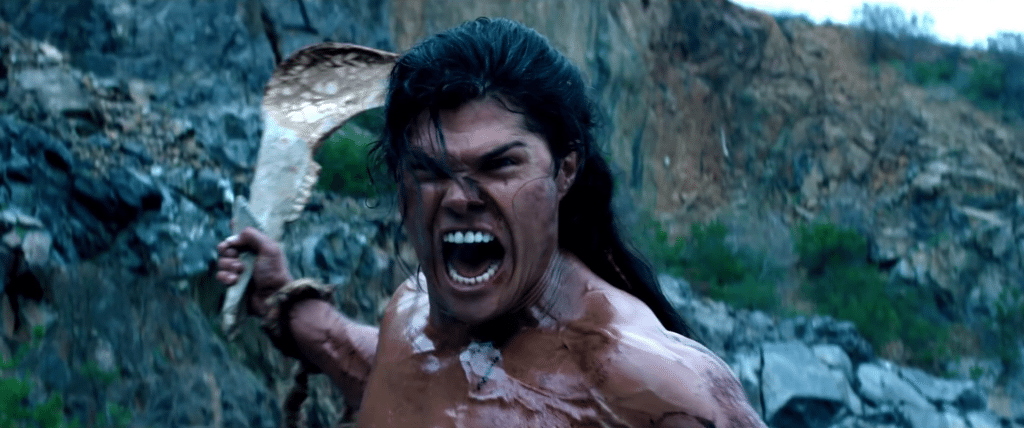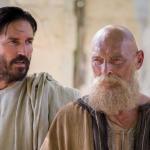Taylor James has been a working actor for over a dozen years now.
In his native England, he has appeared onstage in everything from modern musicals like Footloose and Guys and Dolls to Shakespeare plays like The Winter’s Tale and Romeo and Juliet, the latter of which were produced by the Kenneth Branagh Theatre Company. James has also had bit parts in big-screen films like Mamma Mia! and last year’s Justice League.
But now, he’s tackling his first major lead role in a big-screen movie — and the part he’s playing is none other than Samson, one of the most flawed but iconic biblical heroes.
I spoke to James by phone about the making of the film, which Pure Flix is releasing to theatres this Friday. What follows is a lightly edited transcript of our conversation.
–
What was it that drew you to this role?
James: What drew me to this role! It’s one of the most iconic, if not for me the most iconic, stories within Judges in the Bible. Samson is about power, his story of power, how he had it, how he lost it, and then how ultimately he had the chance for redemption at the end. I saw a flawed hero within Samson, I saw somebody who was reluctant, I saw a lot of the characteristics of many of the young guys coming into the NBA, a lot of guys graduated from school, a lot of those youthful, impulsive, foolish — but quite rightly so — decisions, and there’s nothing like watching, for me, a character lose everything and then win it all back. So that was what drew me to Samson.
And then on the other side, when I read the screenplay and I saw how the writers and the Pure Flix team wanted to flesh out the story and give audiences an opportunity to see a deeper, a richer world — whether it be the environment or the characters, and even the moments within Samson’s plight more embellished — that was hugely exciting.
Is this your first lead role?
James: On film and on this level, yes. I’ve been working in theatre for about twelve, thirteen years in London’s West End, and I’ve played lead roles in plays and in musicals, and I’ve got to understudy and work alongside people like Dame Judi Dench and the late Patrick Swayze, so I’ve had a chance to get my teeth stuck into things, but on this platform, and in the medium of film, yes, this is my biggest thing to date, and I’m thrilled.
You mentioned that you were drawn to the iconic nature of the role. Was the fact that the role is so iconic a little daunting at all?
James: Personally, Peter, it wasn’t daunting, it was exciting. I’ve been very patient in my career thus far, and I’ve been studying for the last twelve, thirteen years, and I feel graduation time has come and it’s my opportunity now to show audiences and directors and producers how I tell a story and what I can bring to a role. And I’m no stranger to the gym, and that was my own foresight and fortitude that I had, that kept me plugging away in the gym and prepping myself for the opportunity, when it arose, that I would be ready for it. And with all those things coinciding, I just felt at my most peaceful and at my most natural on the set with Bruce [Macdonald], the director, and other people involved in Samson.
And I remember telling my friends and family that, truly, Peter, I’ve never felt happier in my life, and never felt more confident, and never felt that the voice within is the right time to be heard. Because I believe we created an emotional side and a physical side to Samson that a lot of other actors may not have been able to bring. And in a non-arrogant way, I want to share that with people, because Samson, as a character, deserves that, and I feel that I have those qualities to play Samson and show both sides to him, the vulnerable and the physically powerful.
Well, your Samson’s a really well-rounded character. He’s got the action, there’s also a lot of humour, and there are the tragic love stories and all that. What was the most enjoyable part of that to play?
James: I remember one day, going through the sides, as we call them, the shooting script of the day — I flipped through page one, page two, page three, and I shouted out of the trailer, “Is there no dialogue today?” And someone said, “No, it’s just action!” And I just remember throwing the sides in the air and saying, “Yes, let’s have some fun!” It was literally like, I didn’t even feel that we were working, that we were trying to capture anything on film, because nothing needed to be said. And that also is what is wonderful about a screenplay of film, it is telling a story with images, and sometimes we get bogged down in all the dialogue, and I feel that, to allow the audience to have their own interpretation of the emotions by giving them moving imagery, is far more liberating and rewarding. And it was fun that day, so for me, I loved having a little bit of action, because we got to move away from the deeper, darker matters.
But on the other side, my most favorite scene is the scene right at the end of the film, right before he gets hung up and whipped. It’s the scene in the pit when Samson is blinded, he’s lost his father, he’s lost his first wife, he’s lost absolutely everything, and he has the moment of ultimate humility when he finally gives in to God and decides to walk the path that God has asked him to do, and that’s where he feels his strongest. And for me, that is one of the deepest, most beautiful dramatic scenes, both shot by the DOP, Trevor [Michael Brown], and directed by Bruce. It’s wonderful.
How about just getting ready for the role. We’ve talked about how iconic the character is, but I don’t know how many people have read the Book of Judges, for example. Was there anything about preparing for the role that surprised you, or anything you learned that you didn’t know before?
James: Yes, there were lots of things within the three chapters that I couldn’t recall if you had put me on the hot seat test when I got the role. So I went through and just soaked them all up and got lost in how Pure Flix would tell this on a cinematic level, and I got lost in how it was going to look, and very excited by that. So those were the things that surprised me, that there are so many moments within his journey, his 20-year arc. I couldn’t believe that no one had done it in this modern age of cinema. It’s the ’50s since it’s been done. Within the world of remakes that we live in, and reboots and stuff, I just think that Samson has been overlooked, and thankfully Pure Flix didn’t overlook it and have put it full systems go.
The scene with the lion: Were you ever actually on the set with the lion, or is that all editing and visual effects?
James: (conspiratorial whisper) Well between us, Peter, I’ve already told my friends that it was, so I can’t really lie and say, uh, no. (normal voice) But no, there was a lion, a real lion, and there was me, and there was a fantastically built animatronic puppeteer lion, and there was a very fine line between the both of them. I was behind a glass screen when the lion came, and then they swapped it around with the other lion. But I told my friends I’ve wrestled with a real lion, so now they’re going to think I’m a right (word obscured by laughter). Listen, Peter, let’s take that last part out, shall we, darling?
Oh really?
James: No, I’m teasing, I’m teasing. Go ahead. It was a mix of all three.
What was it like working with some of the other actors there, like Rutger Hauer [who plays Samson’s father] and Billy Zane [who plays the Philistine king]?
James: Wonderful, really really wonderful. Because what they bring is their version of how to tell stories, what they think is best, whether it’s their viewpoint on what camera angle we should go with or how we should play this scene, or if any dialogue needs to be rearranged. Everybody has their opinion, and obviously they’ve had decades– They’ve been in the business longer than I’ve been doing the business — they’ve been doing the business as long as I’ve been alive, some of them — and that’s an incredible achievement. So to glean as much information from them as possible, on a storytelling, creative, artistic point, was fantastic.
And then also just to kind of be a little bit of a fanboy. I mean, like, my dad’s from Blade Runner and my mom [played by Lindsay Wagner] is the Bionic Woman! It was great, because you have more confidence in the piece, that such prestigious actors are choosing to work on this piece with you, and that can only drive the story forward.
I’m a big fan of Bible movies, and I know that Samson was shot in South Africa, and that’s also where they shot Of Kings and Prophets. I gather that a few people, at least, from that TV show, worked on Samson as well. I think the Philistine jailer in Samson was the same actor who played Goliath–
James: Yes, his name is Garth [Collins]. Wonderful guy.
So when you talked shop or whatever, did you hear stories about what that Bible series was like, and how it compared to this Bible movie you were making, stuff like that?
James: On set, no, there wasn’t really a lot of talk about it. A couple of people listed their previous credits in easy conversation, not like a test or game of top trumps, and Kings and Prophets came up, as you said, quite a lot. And I think that’s just because it was one of the last big things to be shot over there. I also know the creatives who were involved in that project, and that’s the most I know about the project, other than watching the first couple of episodes. It’s a fantastic series — sword and sandals, difficult thing.
South Africa is a perfect location for that, and that’s why we chose it for Samson. It is a dream landscape. The climate’s perfect. The people are fantastic, hard-working. And you just watch the footage that you’ve caught on camera in South Africa, well, you can kind of switch off from the acting because it’s so beautiful, and it just helps the audience be transported. And I feel that, for us, South Africa was a huge blessing and so integral to the heart of Samson.
What do you hope audiences will take away from the film?
James: I hope that everybody’s opinion is unique, that they drive back or walk home, that they have a personal connection with something within the film that’s struck a chord and resonated with that person — because that, for me, Peter, is good art. You can go to an art gallery and look at a picture on the wall, and you can see something and I can see something else. But when you get that chord, with you and the picture, or you and Samson, that’s all that matters. It’s done its job.
Obviously, I feel that I want them to talk about how God ultimately forgives us no matter what, and no matter how many times we fail or sin. I also want them to think about how most people are reluctant to do the thing that they’re most afraid of. And ultimately, Samson was afraid. He was reluctant, he wanted to do something else, and that fear can limit us. And I believe that is something that is prevalent in life today, and it’s probably the one thing that I would like most people to have a unanimous agreement on, as well as their own personal chord connection.
I understand that you had a bit part in the Justice League movie that came out last year, in one of the Atlantis scenes, right?
James: Yes. My scenes were with Amber Heard, and Zack [Snyder] was thankfully still around and directing when I was doing it, yeah.
So are you going to be in the Aquaman feature at all?
James: No, I’m not. I think that’s still being shot, but it’s down in Australia. I did speak with Amber about it at the time, and made it known that I was considering it, but then Samson came along and, well, I smiled and said, “It’s going to be Samson,” because that’s what I wanted.
Do you look forward to going back to the stage now after this, after getting a movie with big action scenes and days with no dialogue and so forth?
James: I look forward to telling great stories in the best possible way. I want to spend as much time in film as I can, as possible. I like doing lots of action, because I think it’s fantastic and it can draw huge audiences to come and see the story, because it becomes a spectacle. But I also want to make sure that there’s always a message within that story, for me. And I feel that some of the films out there have lost that core value of the message, and ultimately you come away from a film feeling a little vacuous and like, Well, what was all that about? And you don’t have any empathy for the characters. I feel the filmmaker or the creative person has missed a trick there. And there’s also a missed part of their responsibility, and part of their responsibility is to entertain but it’s also to convey a message. So, yeah, I’m very excited about what the next projects are, yes.
— Samson comes to theatres across North America on February 16.














